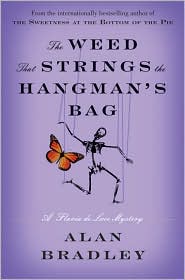The Weed That Strings The Hangman's Bag. (Flavia de Luce #2). Alan Bradley. 2010. Random House. 364 pages.
I was lying dead in the churchyard. An hour had crept by since the mourners had said their last sad farewells.
I liked Sweetness at the Bottom of the Pie. I did. But as much as I liked it, as charming as I found it, it wasn't quite love.
I LOVED the second novel in the series, The Weed That Strings the Hangman's Bag. I just LOVED it. Flavia is still Flavia. She's still eleven. She's still hating her sisters--but to be fair, they hated her first. She's still to be found in her chemistry lab doing experiments and uncovering the mysteries of poisons--that is when she's not out uncovering the town's secrets on Gladys, her bicycle, and breaking into the library's storage shed where old newspapers are kept.
The mystery begins with Flavia coming across a damsel in distress--a woman crying in the churchyard. This stranger, Nialla, is the assistant to the 'famous' puppeteer, Rupert Porson. The two were traveling the country in their van when it broke down. To earn the money needed to repair it, they agree to do two shows for the community. Performances of Jack and the Beanstalk. The first performance? Wonderful! Couldn't have gone any better. The second? Well, let's just say that it's a show no one will forget. It ends with the police questioning them all!
But as Flavia soon discovers, this isn't Rupert's first trip to town. And discovering his shady past--within the community--may just solve the mystery of who murdered him.
I loved this one. I loved the writing, the style. The descriptions, the details, were great.
"She was prattling. If I kept quiet, it wouldn't be more than a minute before she would be confiding her size in knickers." (20)
"Of the many phrases that came to mind to describe Cynthia Richardson, "good sport," was not among them; "ogress," however was." (30)
Here is Flavia's description of one of the musical "treats" before the show--both performed by church members.
Miss Lavinia, her eyes riveted to the music, was into "Napoleon's Last Charge," and I noticed for the first time that, as she read the music, her lips were moving. I couldn't help wondering what she was saying. There were no lyrics to the piece--could she be naming the chords? Or praying? Mercifully, she took it at a somewhat faster gallop than usual, and the thing was soon over--at least relatively speaking. (147)Flavia on being eleven.
"You are unreliable, Flavia," he said. "Utterly unreliable."Alan Bradley is great at developing characters within a community. There are some eccentric people in this one! But it's got heart and soul too! I loved Flavia! I loved her spirit. I loved her intelligence, her curiosity. I would definitely recommend it!
Of course I was! It was one of the things I loved most about myself.
Eleven-year-olds are supposed to be unreliable. We're past the age of being poppets: the age where people bend over and poke us in the tum with their fingers and make idiotic noises that sound like "boof-boof"--just the thought of which is enough to make me bring up my Bovril. And yet we're still not at the age where anyone ever mistakes us for a grown-up. The fact is, we're invisible--except when we choose not to be. (112)
© Becky Laney of Becky's Book Reviews
 6:53 PM
6:53 PM
 Nikki
Nikki


 Posted in
Posted in





